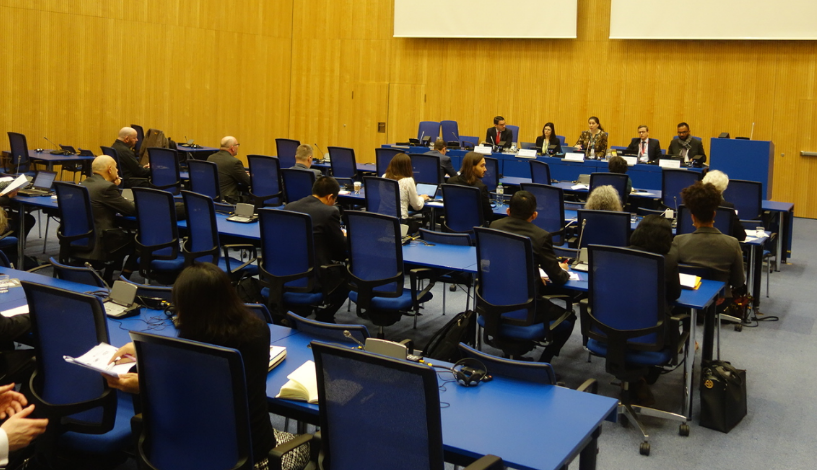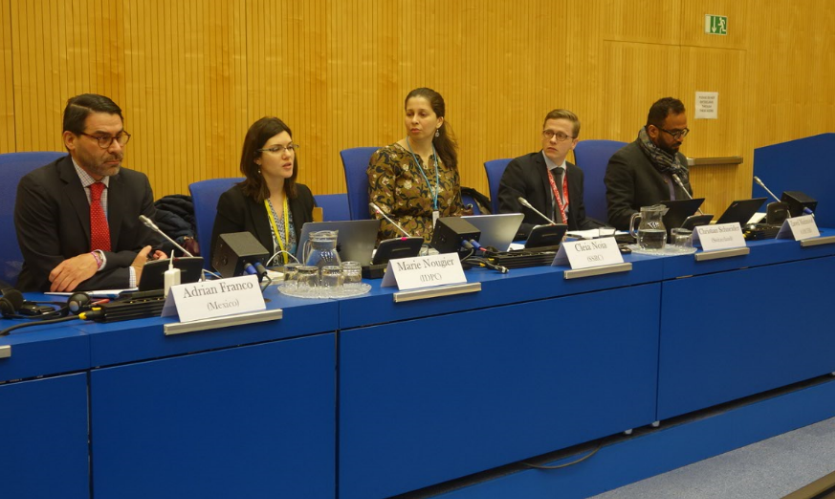Side Event: Measuring drug policy outcomes: Intersections with human rights and the sustainable development goals
Organised by the Government of Switzerland, the Office of the High Commissioner for Human Rights, the International Centre for Science in Drug Policy, the International Drug Policy Consortium, the Global Drug Policy Observatory of Swansea University, Centro de Estudios Legales y Socials and the Social Science Research Council

Moderator: Adrian Franco, National Institute of Statistics and Geography, Mexico
This side event stresses 3 things:
- Measuring drug policy outcomes – so we know about the setback and progress – the ARQ provides statistical information
- Human rights – its impossible to imagine public policy without a human rights approach – particularly drug policy
- Sustainable development goals – SDG5, SDG16, SDG17
Cleia Noia, Programme Manager, Drugs Security and Democracy Programme – Social Science Research Council (SSRC)
Thank you – I’ll talk about the paper: Aligning Agendas: Drugs, Sustainable Development, and the Drive for Policy Coherence
The need for new drug policy metrics is not new – but has gained momentum in the last few years particularly with UNGASS in 2016. Research is needed regarding illicit crop cultivation and in line the sustainable development agenda. There are two key benefits – you need to help drug policies enhance rather than hinder the SDGs. It’s important to have drug policies aligned with multiple goals so as not to undermine. Policy makers need better and different metrics.
- Development a framework for policy coherence – we need to develop adequate framework – goal 17
- Need to create an external advisory committee to monitor progress comprised of drug policy and development experts
- Add SDG indicators related to drug policy – we only have one so far – but we have suggestion for aligning SDG1, 5 and 16 – it doesn’t matter if we have great indicators, but no good metrics
- Custodian agencies must put in metrics for collecting data on drug policies
- Why don’t we look at sustainable development metrics to better align drug policy metrics in general – improve data collection standards in ARQ to evolve comprehensively
- The need to prioritise outcome oriented metrics – UN member states should truly broaden away from just supply and demand – particularly in relation to policy outcomes – we have a tremendous opportunity here to expand
UN member states should truly consider the sustainable development framework in their drug policy metrics
Marie Nougier, Head of Research and Communications, International Drug Policy Consortium (IDPC)
Adoption of SDGs in 2015 gives us better ways to measure drug polices. It’s now recognised that women experience particular harms from drug policies eg women who use drugs, women who produce illicit crops. Even in places where alternative development is implemented, women don’t benefit
Women play minor role in micro trafficking but experience higher levels of incarceration and longer prison sentences. Their imprisonment doesn’t affect the overall drug market, but affects them personally very much.
We really appreciate the interventions made by Mexico on this topic. But much more needs to be done. The agenda for sustainable development is a means for advancement in measuring drug policy outcomes
SDG5 gender equality:
5.1 calls for the end of all forms for discrimination
5.2 calls for elimination of violence against women – tracking the number of women coerced into drug market.
Many other goals and targets can be used: 1.4 equal rights to resources, 3.3 end AIDS TB malaria and hepatitis – women who use drugs are particularly affected here.
ARQ currently doesn’t include much on tracking particular impacts of drug policies on women. Also require UNODC to work with other UN agencies. Zaved’s presence here is very important.

Christian Schneider, Drug Markets and Drug Policy Analyst, Swiss Federal Office of Police
We look forward to the improvements that have been mentioned so far today. 2 points: the drug policy metric system is currently a self reported system through the ARQ, member states reporting to UNODC. Discomfort with this self reported system –there is a lot of uncertainty between member states data. The UNODC has been good in acknowledging this uncertainty. A lot of parties in the drug market try to hide data, so self report system misses a huge art of the black market. There are other relevant groups in the market that we could get quality data from as mentioned previously. There is a lot of data already out there, but it is problematic. What is being presented is being taken into account. By taking SDGs into account we will have more comprehensive drug policies and metrics.
Zaved Mahmood, Human Rights Officer, Office of the High Commissioner for Human Rights (OHCHR)
From a human rights perspective the data collection in any context is very important. Data collection in regard to ARQ and has to be balanced at the national level. We need to think about the human rights consequences of drug policies.
Paragraph H chapter 4 outcome document – recommends ‘to consider the inclusion of information concerning the promotion of human rights and health’. How do we work with the UNODC to ensure human rights are measured in their drug policy metrics? We need to utilise the human rights indicators.
Categories of indicators used for human rights:
- Qualitative and quantitative data, objective or subjective – we have a book here – ‘human rights indicators
The info shouldn’t be coming from one source – i.e. just member states.
There is a possibility that if you’re on a list of drug users, you could be arrested – there is a perception here in Vienna that info should only come from member states – but to balance, we need subjective information from civil society.
Ethical, statistical and human rights considerations in the indicator selections; the 3 main human rights principles in relation to data collection are: self-identification, participation, data protection
In Bangladesh the government said they’ll make a list of drug users – is it for treatment or prosecution? We have to be very careful with the right to privacy here.
R.I.G.H.T.S. criteria for indicator selection (acronym)
Relevant and reliable
Independent
Global and universally meaningful
Human rights standards centric
Transparent, timely and time bound
Simple and specific
Question Time
Questions from audience:
Q: Katherine Pettus, International Association for Hospice & Pallative Care: What is missing from this document (‘Aligning Agendas’) is access to controlled medicines – 3.8 – I’ve identified 5 SDGS, and we’ve proposed an indicator
A: Marie: This is very important
A: Cleia: This report is just a start – we want a broader view on metrics
Q: Larissa Maier: More and different data are needed – I’m from the global drug survey – is there a way to fund more independent data? We have the advantage to reach out to PWUD
A: Marie: The global drug survey is excellent – talking about drug use habits, and talks on women – I hope it gets more funding
A:Christian: Most of the things I do are very short term – I’m pessimistic on member states funding long term studies
Q: Steve Rolles: I’ve been following the Human Rights Council about whether they should continue scrutiny of drug policies – the resolution currently being discussed is really struggling here – member states – how do we proceed in terms of developing human rights indicators?
A: Marie: How are civil society represented here – its implied that civil society aren’t worth including – we need to advocate more to be included.
A: Zaved: There’s more scope for us to work on national level here – how are they going to measure national policies in terms of human rights indicators?
Q: Civil society rep from Slovenia: We focus too much on supply reduction; measurements drug demand indicators are also important – but I know it’s more difficult to find
A: Marie: This why we’re calling for the end of the 2009 Political Declaration
A: Christian: Yes, there are more supply metrics, but it’s not of high quality
A: Zaved: There are very little demand indicators – there is a balance needed – I looked at the ARQ – only 1 question on criminal justice. I’d like to thank the bloggers, for making this conversation available to those who aren’t here.
Penny (blogger): Thank you, no worries!